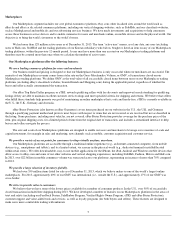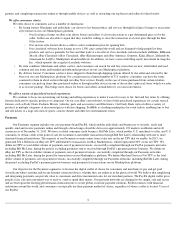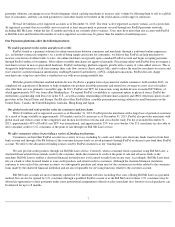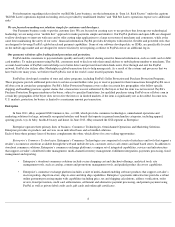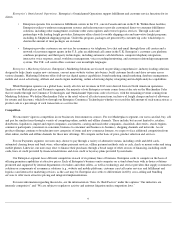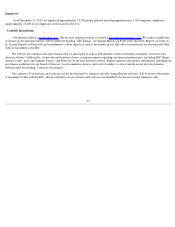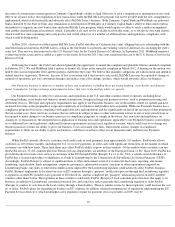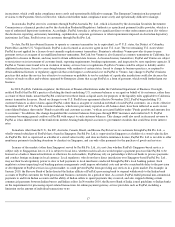eBay 2013 Annual Report Download - page 17
Download and view the complete annual report
Please find page 17 of the 2013 eBay annual report below. You can navigate through the pages in the report by either clicking on the pages listed below, or by using the keyword search tool below to find specific information within the annual report.
The sluggish economy and the sovereign debt crisis could harm our business.
Our Marketplaces, Payments and Enterprise businesses are dependent on consumer purchases, and our Enterprise business is also impacted
by the offline businesses of our Enterprise clients. The economic downturn resulted in reduced buyer demand and reduced selling prices, and the
slow recovery and potential impact of a shutdown of the U.S. government, a failure to raise the “debt ceiling”,
or automatic sequesters, as well as
the impact of the sovereign debt crisis and resulting austerity measures in Europe, may reduce the volume and prices of purchases on our
Marketplaces platforms, the volume and prices of transactions paid for using our Payment services and the online and offline businesses of our
Enterprise clients, any of which would adversely affect our business. These macroeconomic factors could also have a negative and adverse
impact on companies with which we do business, which in turn could have a further adverse effect on our business.
We are exposed to fluctuations in foreign currency exchange rates and interest rates.
Because we generate the majority of our revenues outside the U.S. but report our financial results in U.S. dollars, our financial results may
be impacted by fluctuations in foreign currency exchange rates. In connection with its multi-currency service, PayPal fixes exchange rates twice
per day, and may face financial exposure if it incorrectly fixes the exchange rate or if exposure reports are delayed. Given that PayPal also holds
some corporate and customer funds in non-U.S. currencies, its financial results are affected by the translation of these non-U.S. currencies into
U.S. dollars. In addition, the results of operations of many of our internationally focused websites are exposed to foreign currency exchange rate
fluctuations as the financial results of the applicable subsidiaries are translated from the local currency into U.S. dollars upon consolidation. If
the U.S. dollar weakens against foreign currencies, the translation of these foreign currency denominated transactions will result in increased
revenues, operating expenses and net income. Similarly, if the U.S. dollar strengthens against foreign currencies, our translation of foreign
currency denominated transactions will result in lower net revenues, operating expenses and net income.
For the year ended December 31, 2013, foreign currency movements relative to the U.S. dollar positively impacted our net revenues of
$16.0 billion by more than $24 million (net of a negative impact from hedging activities included in PayPal's net revenue of approximately $4
million) compared to the prior year. As foreign currency exchange rates vary relative to the U.S. dollar, net revenues and other operating results,
when translated, may differ materially from expectations. In particular, to the extent the U.S. dollar strengthens against the Euro, British pound,
Korean won, Australian dollar, or Canadian dollar, our foreign revenues and profits will be reduced as a result of these translation adjustments.
While from time to time we enter into transactions to hedge portions of our foreign currency translation exposure, it is impossible to predict or
completely eliminate the effects of this exposure. Fluctuations in foreign currency exchange rates could significantly impact our financial results,
which may result in an impact on the price of our stock.
In addition, we face exposure to fluctuations in interest rates. Relatively low interest rates have continued to limit our investment income,
including income we earn on PayPal customer balances. In addition, we may incur additional indebtedness in the future, including through
public or private offerings of debt securities, or through the credit markets. A rise in interest rates would increase the cost of such indebtedness in
the future. Fluctuations in interest rates that limit our investment income and/or increase the cost of future indebtedness could adversely affect
our financial results.
Bill Me Later's operations depend on lending services provided by unaffiliated lenders.
In November 2008, we acquired Bill Me Later, a company that facilitates credit services offered by unaffiliated banks. Bill Me Later is
neither a chartered financial institution nor is it licensed to make loans in any state. Accordingly, Bill Me Later must rely on a bank or licensed
lender to issue the Bill Me Later credit products and extend credit to consumers to offer the Bill Me Later service. Currently, when a consumer
makes a purchase using a Bill Me Later credit product, a chartered financial institution extends credit to the consumer, funds the extension of
credit at the point of sale and advances funds to the merchant. We subsequently purchase and retain most of the consumer receivables related to
the consumer loans made by the chartered financial institution and, as a result of the purchase, bear most of the risk of loss in the event of loan
defaults. Although the chartered financial institution continues to own each of the customer accounts, we own most of the related consumer
receivables and Bill Me Later is also responsible for servicing functions related to the customer account.
In September 2010, WebBank became the issuer of the Bill Me Later credit products. In August 2013, Comenity Capital Bank became an
issuer of the Bill Me Later credit products, and WebBank transferred most of the customer accounts that it owned to Comenity Capital Bank. As
part of this arrangement, we sell Comenity Capital Bank a participation interest in the entire pool of consumer receivables outstanding under the
customer accounts that it originates. In addition, WebBank will continue to originate loans on those accounts that it retained. Bill Me Later also
has put in place an arrangement with WebBank whereby WebBank has agreed to resume ownership of (and resume lending with respect to) all
customer accounts in
15


